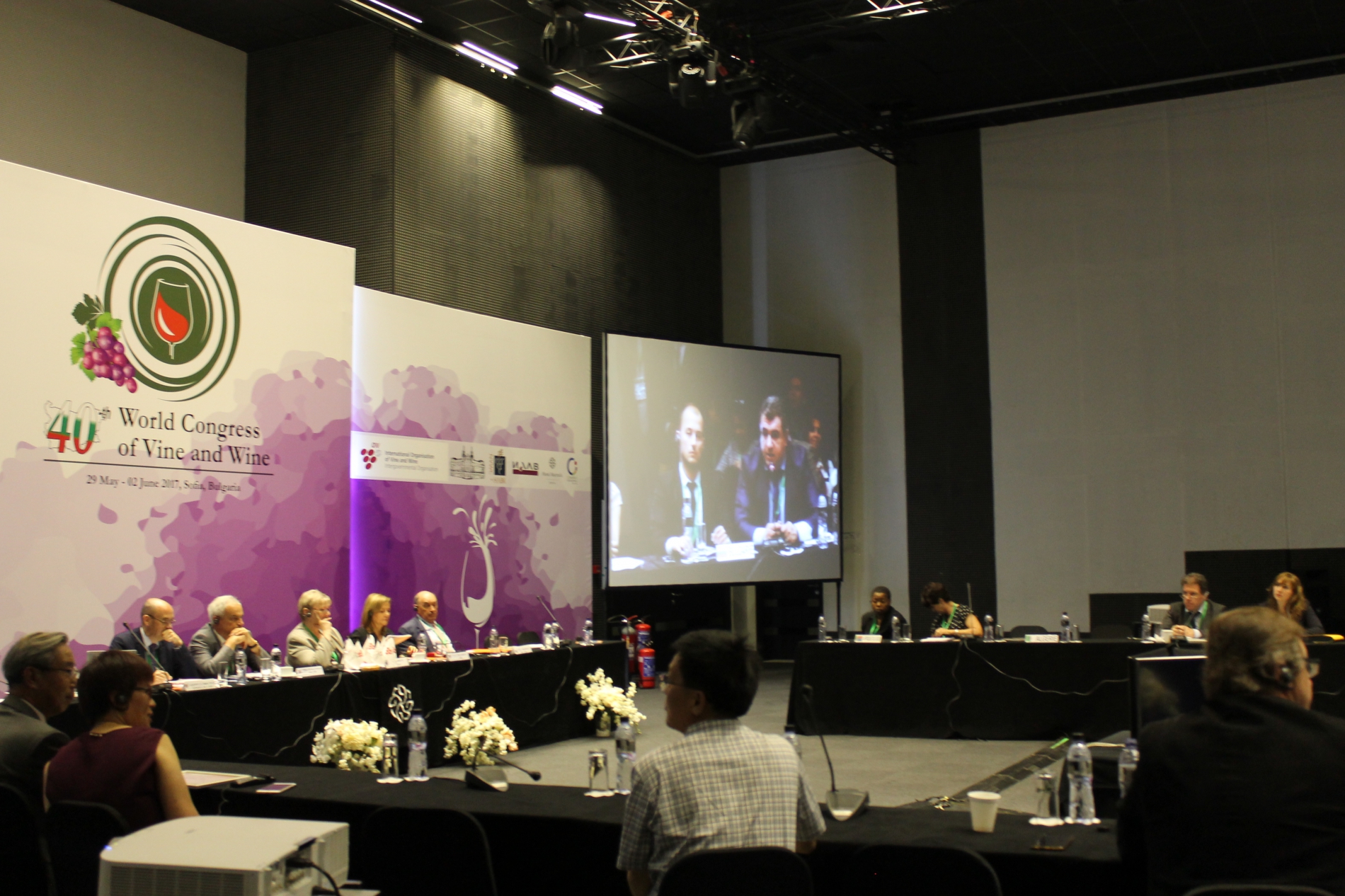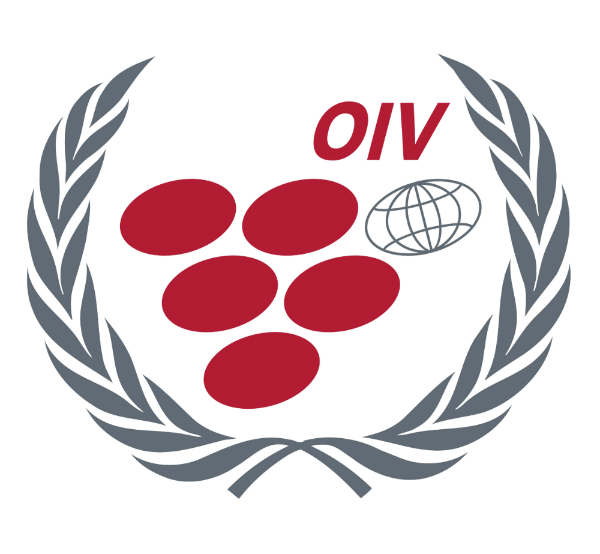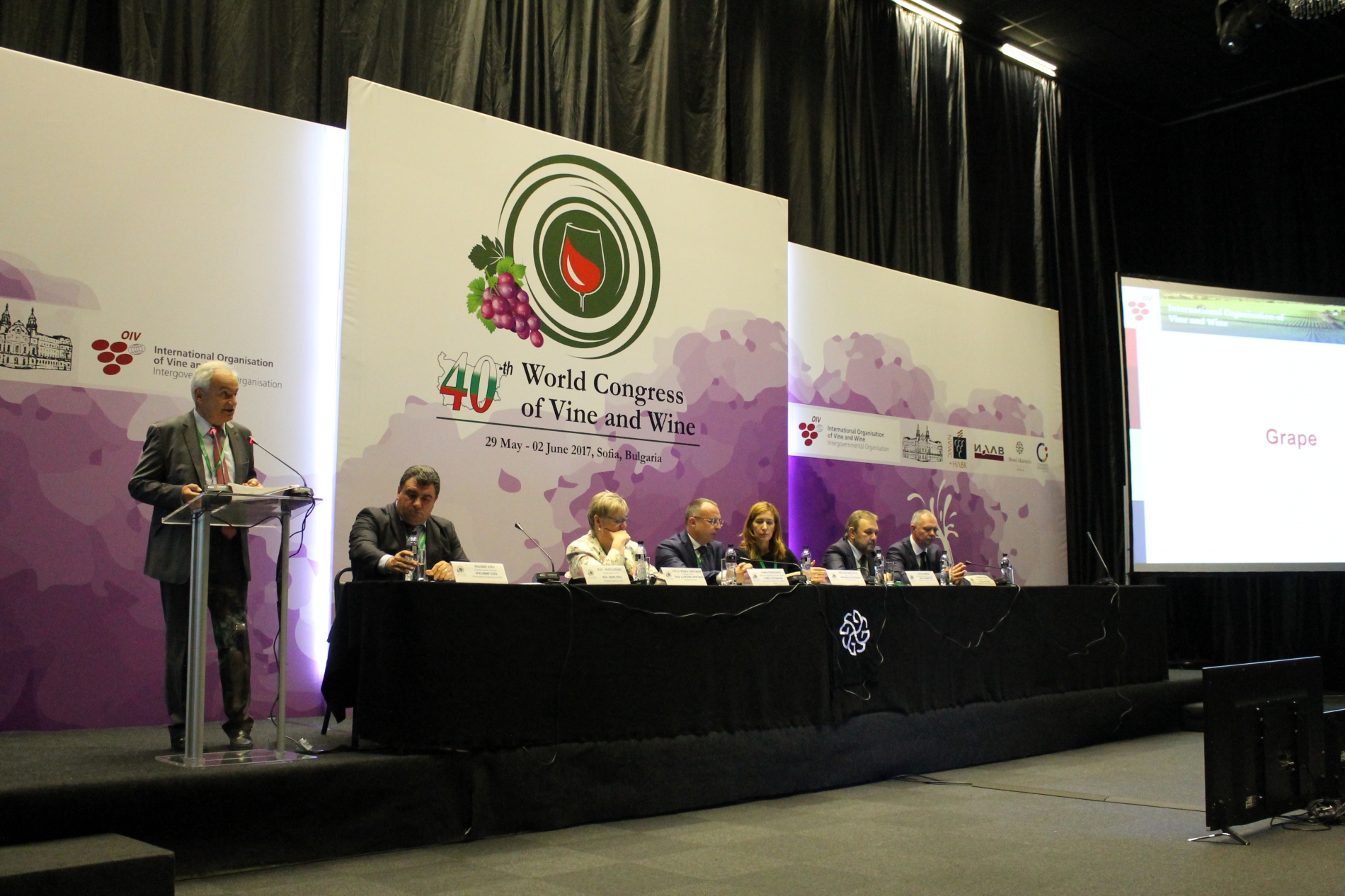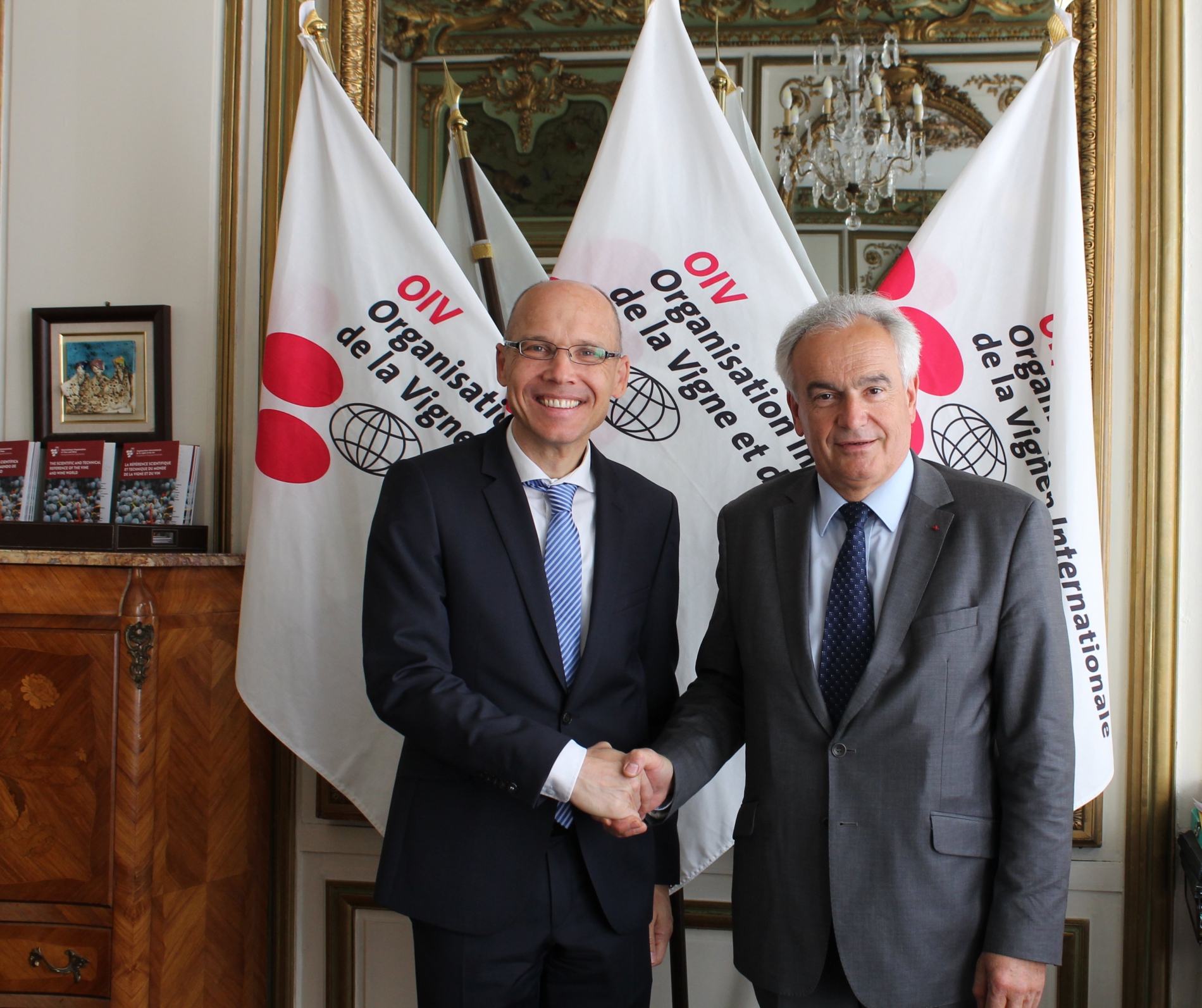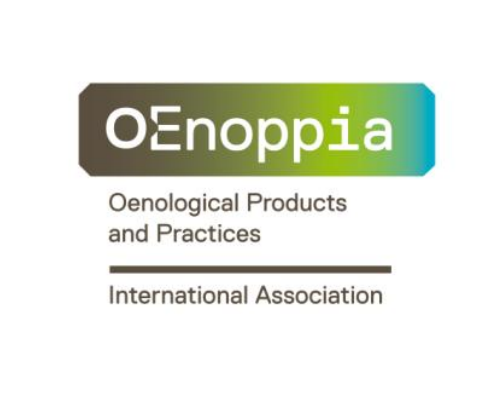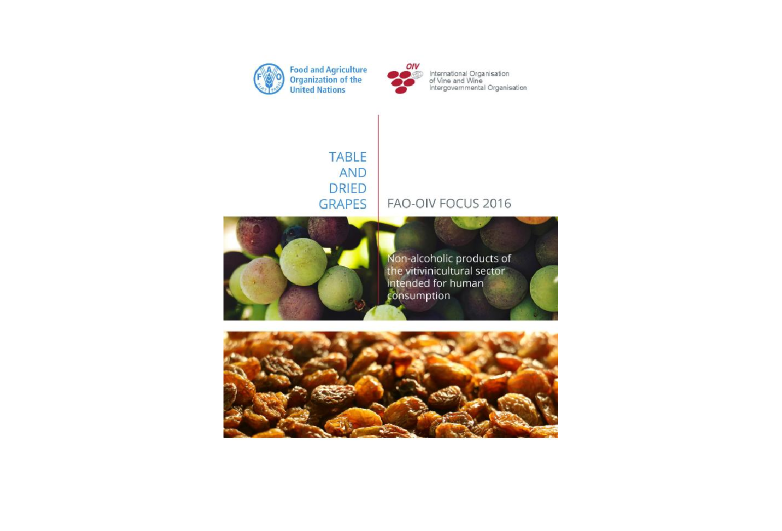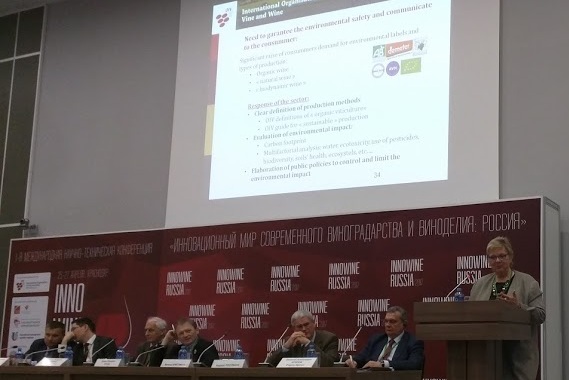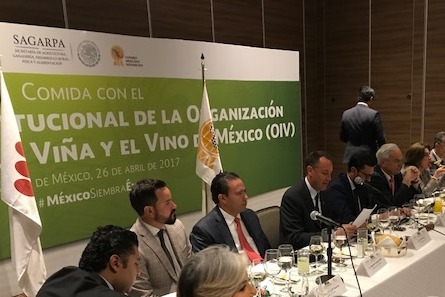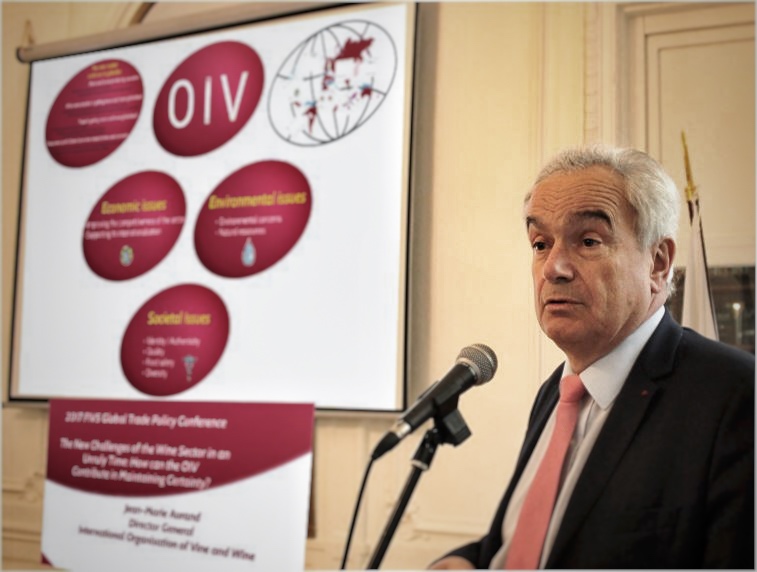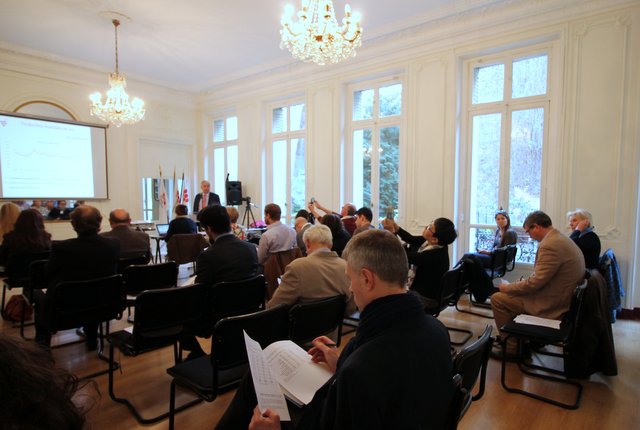06 июн 2017
Decisions on Viticulture and the Environment
- In the field of viticulture, the OIV adopted a standard protocol for the clonal selection of vine varieties (Resolution OIV-VITI 564A-2017) that takes into account the progress achieved in the areas of scientific research and diagnostic techniques, as well as the different criteria that exist within the OIV Member Countries. Among the different points of the protocol, the term 'selected clone' is defined. Likewise, a number of parameters are described regarding the cultivation capabilities of candidate clones for vine varieties, such as phenological data, sensitivity characteristics and/or factors affecting resistance characteristics, yield parameters and quality parameters.
- Official guidelines for recognising grapevine collections at an international level (Resolution OIV-VITI 539-2017). These guidelines propose a series of criteria to be met with a view to establishing an international standard designed to harmonise the criteria for, and utility and efficiency of genetic resources. Vine collections that comply with these criteria will benefit from the recognition of the OIV and inclusion on the OIV list of varieties and vine collections available on the Organisation's website.
- Treatment of musts with calcium sulphate for liqueur wines (Resolution OIV-OENO 583-2017). The objective of this practice is to develop liqueur wines that are balanced with regard to their taste sensations, to promote good biological evolution and satisfactory storage of liqueur wines, and to remedy insufficient natural acidity. The dose should not exceed 2 g/L calcium sulphate since this amount makes it possible to reach a pH of 3.2, which is a suitable level for the vinification of these musts. The residual sulphate content in the wines should not exceed the OIV limit
- Treatment of wines using selective plant fibres (Resolution OIV-OENO 582-2017). The objective of this practice is to reduce ochratoxin A levels in wines, as well as the number and levels of phytosanitary product residues detected in wines. Selective vegetal fibres are incorporated as processing aids, either during filtration with continuous deposition, or as a constituent of a filter sheet. The recommended dosage is determined according to the filtration technique used, without exceeding 1.5 kg/m2 of the filter sheet surface area.
- The treatment of musts with potassium carbonate, which has been permitted by the OIV within the context of the chemical deacidification of musts (Resolution OIV-OENO 580-2017). This new processing aid will be added to the list of products authorised for the reduction of the titratable acidity and the actual acidity.
- Treatment of musts and wines using inactivated yeasts with guaranteed glutathione levels (Resolutions OIV-OENO 532-2017 and OIV-OENO 533-2017). The objectives of these practices are to promote yeast metabolism through the provision of naturally-occurring nutritional compounds and to limit the oxidation of musts and wines by certain varietal aromatic compounds revealed by the metabolism of yeasts (particularly thiols). The dose used of glutathione – supplied directly or via yeasts with guaranteed glutathione levels – should not exceed 20 mg/L, in order to avoid any risk of reduction and the emergence of a yeast taste.
- An update to the monograph on Saccharomyces yeasts (Resolution OIV-OENO 576A-2017). Different forms of selected Saccharomyces yeasts may be used. Detailed specifications accompany this monograph, including the percentage of dry matter and the levels of viable yeasts according to the different forms. This monograph thus supplements the oenological practice.
- A monograph on non-Saccharomyces yeasts (Resolution OIV-OENO 576B-2017) used for the inoculation of grapes, musts and wines. As addition of non-Saccharomyces yeast might not result in the completion of alcoholic fermentation, inoculation with non-Saccharomyces yeasts may be followed by or complemented at the same time by inoculation with Saccharomyces spp. Detailed specifications accompany this monograph, including the percentage of dry matter and the levels of viable yeasts according to the different forms. This monograph thus supplements the oenological practice.
- An update to the monograph on tannins relating to the method for determination of polyphenols (Resolution OIV-OENO 574-2017). This method is designed to measure the polyphenol concentration of preparations of oenological tannins in polyphenols and is based on gravimetric analysis using solid-phase extraction (SPE).
- A monograph on glutathione that supplements the oenological practice (Resolution OIV-OENO 571-2017). Glutathione is used for its antioxidant properties that can fight against oxidation phenomena in musts and wines and protect aromatic compounds. Detailed specifications accompany this monograph, including that of the reduced glutathione content, which should be greater than 98%.
- A monograph on potassium polyaspartate (Resolution OIV-OENO 572-2017). Oenological potassium polyaspartate is exclusively prepared from L-aspartic acid. Detailed specifications accompany this monograph, including the degree of substitution of potassium salt, which should be at least 91.5% to guarantee optimal solubility.
- A monograph on selective plant fibres (Resolution OIV-OENO 578-2017). Selective plant fibres come from the edible parts of certain plants, generally of cereal origin. Selective plant fibres have a total insoluble parietal compound content of a minimum of 90% (m/m). Detailed specifications accompany this monograph, including the capacity for adsorption of certain pesticides, as well as that of ochratoxin A.
- A revision of the monograph on the PVI/PVP copolymer specifically relating to the maximum iron limit, which was brought up to 5 mg/kg of substance (Resolution OIV-OENO 605-2017).
- A method for the determination of 1,2-propanediol and 2,3-butanediol in musts and wines was adopted (Resolution OIV-OENO 589-2017). This method applies to the determination of the 1,2-propanediol and 2,3-butanediol that form after fermentation processes. These compounds are practically absent in unfermented musts, yet present in wine up to certain limits. The extracts are directly analysed via GC-MS on a polar column. The measurement is conducted according to the retention time and the mass spectrometer.
- A method of determination of the 13C/12C isotope ratio of glucose, fructose, glycerol and ethanol in products of vitivinicultural origin by high-performance liquid chromatography coupled to isotopic ratio mass spectrometry (Resolution OIV-OENO 479-2017). This type II method for glucose, fructose and glycerol and type III method for ethanol, based on the chemical oxidation of organic matter in CO2, makes it possible to determine the 13C/12C isotope ratio of the compounds using isotopic ratio mass spectrometry.
- A method relative to the determination of chitinase and thaumatin-like proteins in white wines (Resolution OIV-OENO 529-2017). This immunological method of semi-quantitative immunoprinting makes it possible to determine the presence or absence of unstable proteins in wines. Therefore, chitinase and thaumatin-like proteins can be detected from a total concentration of as low as 1 mg/L in wines.
- An update to the method of determination of ethyl carbamate (Resolution OIV-OENO 590-2017). The principle of this method is based on the determination of ethyl carbamate in spirituous beverages by gas chromatography/mass spectrometry (GC/MS) coupling. This method applies to spirituous beverages and spirits of vitivinicultural origin whose dry extract is either lower or higher than 20 g/L.
- On the one hand, there was the introduction of the definition of 'apparent alcoholic strength' (AAS) (Resolution OIV-OENO 587-2017), which is equal to the number of litres of ethanol contained in 100 litres of hydro-alcoholic mixture with the same density as that of the alcohol or spirituous beverage. Therefore, the AAS is directly deduced from the density of the product, without distillation. The AAS is expressed in % vol. On the other hand, there was the introduction of the principle of obscuration (Resolution OIV-OENO 588-2017), which is defined as the difference between the real alcoholic strength by volume and the apparent alcoholic strength, expressed in % vol.
- The OIV also adopted a recommendation for the establishment of training programmes for sommeliers (Resolution OIV-ECO 568-2017). Sommelier training programmes should guarantee that the sommelier acquires skills and is capable of diligently fulfilling the role as described in the Resolution OIV-ECO 474-2014. In accordance with the UNESCO International Standard Classification of Education (ISCED), the minimum sommelier training programme may be defined as a Level 4 post-secondary non-tertiary education programme or professional certification of equivalent level that prepares for entry into the labour market. The minimum duration will be 600 teaching hours distributed according to the specified curriculum.
- •Finally, the OIV adopted a resolution on the application of sustainable production principles in the production of distillates, brandies and spirituous beverages of vitivinicultural origin (Resolution OIV-ECO 501-2017). This document provides recommendations for the implementation of the five general principles of sustainable production in vitiviniculture, as they are defined in Resolution CST 518-2016. The document also covers the production process of distillates, brandies and spirituous beverages of vitivinicultural origin as they are defined in Part 1, Chapter 7 of the International Code of Oenological Practices.
01 июн 2017
Originality and high quality of the submitted works characterize this very fine 2017 OIV Awards Edition.Press release
2017 OIV AwardsViticulture AwardLa Vigne : ravageurs et auxiliaires - Volume 2Christian Linder, Patrick Kehrli, Olivier ViretFrançais / FrenchSuisse / SwitzerlandEditions AMTRA (Suisse)Œnology AwardIl respiro del vinoLuigi MoioItalien / ItalianItalie / ItalyMondadori Libri spa (Italia)Vitivinicultural Economy AwardIl Marketing del Vino - capire, decidere, agireMario Gregori, Luigi Galletto, Giulio Malorgio, Eugenio Pomarici, Luca RossettoItalien / ItalianItalie / ItalyEdiSES S.r.l. (Italia)History, Literature and Fine Arts AwardLe Vin & le SacréA l'usage des hédonistes, croyants ou libres penseursEvelyne MalnicFrançais / FrenchFranceEditions Féret (France)History AwardLes Femmes et la vigneUne histoire économique et sociale (1850-2010)Jean-Louis EscudierFrançais / FrenchFrancePresses Universitaires du Midi PUM (France)Wine and Health AwardWine Safety, Consumer Preference, and Human HealthCollectif d’auteurs coordonné par / Collective of authors coordonated by :Victoria Moreno-Arribas, Begoña Bartolomé SuáldeaAnglais / EnglishEspagne / SpainSpringer International Publishing (United States)Discovering and Presenting Wines AwardWine Tasting : A Professional Handbook, Third EditionRonald S. JacksonAnglais / EnglishCanadaElsevier (United States)Wines and Territories AwardPaisagens do Vinhedo Rio-GrandenseRinaldo Dal Pizzol, Luis Vicente Elias PastorPortugais / PortugueseBrésil / BrazilOrganização Doris Couto (Brasil)Wines and Gastronomy AwardVinárstvo & somelierstvoŠtefan AilerSlovaque / SlovakSlovaquie / SlovakiaAGRIPRINT s.r.o (Česká Republika)Monographs AwardNel solco degli emigrantiI vitigni italiani alla conquista del mondoIn the footsteps of migrantsThe Italian grapes that conquered the worldFlavia Cristaldi, Delfina LicataEdité en italien et en anglais / Printed in Italian and EnglishItalie / Italy / Italia / ItalienBruno Mondadori -Pearson (Italia)
2017 OIV Special MentionsViticulture special MentionZELENA KNJIGA : HRVATSKE IZVORNE SORTE VINOVE LOZECollectif d’auteurs avec / Collective of authors with :Edi Maletić, Jasminka Karoglan Kontić, Ivan PejićCroate avec introduction en anglais / Croatian with introduction in EnglishCroatie / CroatiaCroatian Agency for the Environment and Nature (Hrvatska)Œnology and Viticulture special MentionDe l’Œnologie à la ViticultureAlain Carbonneau, Jean-Louis EscudierFrançais / FrenchFranceEditions Quæ (France)Vitivinicultural Economy special MentionThe Wine Value Chain in ChinaConsumers, Marketing and the Wider WorldCollectif d’auteurs coordonné par / Collective of authors coordonated by :Roberta Capitello, Steve Charters, David Menival, Jingxue (Jessica) YuanAnglais / EnglishChine / ChinaElsevier (Asian Studies Series) and Griffith University (UK)Literature special MentionLe vin, entre nature & cultureAzélina Jaboulet-VercherreFrançais / FrenchFranceEditions Féret (France)Discovering and Presenting Wines special MentionA la rencontre des cépages modestes & oubliésL’autre goût des vinsAndré DeyrieuxFrançais / FrenchFranceEditions Dunod (France)Monographs special MentionChianti ClassicoThe Search for Tuscany's Noblest WineBill Nesto, Frances Di SavinoAnglais / EnglishEtats-Unis (Italie) / United States (Italy)University of California Press (United States)Symposia Proceedings special MentionEnologia Italiana del 1800Collectif d’auteurs coordonné par / Collective of authors coordinated by :Giusi Mainardi, Pierstefano BertaItalien / ItalianItalie / ItalyEdizioni OICCE – EO (Italia)Symposia Proceedings special MentionLes Rencontres du Clos-VougeotVin et civilisation, les étapes de l'humanisationCollectif d’auteurs dirigé par / Collective of authors directed by :Jocelyne Pérard, Maryvonne PerrotFrançais / FrenchFranceChaire UNESCO "Culture et Traditions du Vin" de l'Université de Bourgogne (France)
27 Май 2017
The report covers the vitivinicultural production potential, areas under vines, global wine production and consumption, and wine import and export volumes.In 2016, the world area under vines rose to 7.5 mha.Global grape production reached 75.8 mt in 2016.2016 world wine production (excluding juice and musts) is estimated at 267 mhl.World wine consumption in 2016 is estimated at 241 mhl.Press ReleasePPT PresentationOIV 2017 report Infrographics (initial information from the thematic report devoted to global vine diversity)
11 Май 2017
On this occasion, he expressed the wish to give new impetus to the collaboration between Slovenia and the OIV. The Director General praised this desire, which falls within the framework of an already close collaboration; this is particularly reflected in the OIV's patronage of the Vino Ljubljana international wine competition, which will take place on 30 June to 2 July this year.Jean-Marie Aurand called for an increased presence of Slovenian experts in the work of the OIV. He also mentioned the possibility of Slovenia organising a presentation of its wines at the Organisation's headquarters.Slovenian viticulture has a long history. Its cultivation of vines dates back to Celtic times, 2500 years ago: Maribor's Stara Trta , planted in the 16th century, is considered the oldest vine in the world.For several years now, the Slovenian vitivinicultural sector has seen a thorough revival with the relaunch of a policy of quality wines, drawing notably on a great variety of terroirs and the development of native vine varieties.Slovenian production has established itself at an average of 600 000 hL of wines per year, 75% of each are white wines. More than 70% of wines benefit from a designation of origin.
10 Май 2017
On this occasion, Jean-Marie Aurand – after having recalled the main missions of the OIV – gave a panorama of the state of the global vitivinicultural sector, highlighting the major trends and issues for the future.Within this context, the discussions focused on a certain number of strategic and topical issues:
- the importance of standards, including those which are internationally recognised, in maintaining the essential characteristics of wine and ensuring the fluidity of trade,
- the role of the OIV as an intergovernmental reference organisation on the subject,
- the principles for setting additive limits,
- perspectives with regard to the labelling of ingredients.
09 Май 2017
After focusing on sparkling wines in 2014 and rosé in 2015, the International Organisation of Vine and Wine (OIV) in collaboration with the Food and Agriculture Organization of the United Nations (FAO) presents a new study about this very important part of the OIV field of expertise, grapes being the fruit crop with the highest total value of production in the world. The study presents some key facts regarding food use and the nutritional value of the grape family products, as well as time series since 2000 on domestic production, exports and imports, market size, and apparent consumption.The Director General of the OIV, Jean-Marie Aurand, as well as the deputy Director of the Statistics Division of the FAO, José Rosero Moncayo underlined that this publication is the tangible output of the good and long-standing FAO-OIV cooperation.Consult the 2016 Focus
09 Май 2017
Monika Christmann presented the OIV, its objectives, its role and statistical data on the current state of the global viticultural market.Opening of the Vinorus exhibitionA meeting of the OIV Russian National Liaison Committee, which was open to the public, was also held as part of this conference. This meeting generated tremendous interest from participants and players in the field. During the meeting, Tatiana Svinartchuk presented the Organisation's operating procedures as well as the main regulatory documents discussed and developed by the OIV.Issues of international cooperation in the development and application of standards of production and commercialisation of wine and other international vitivinicultural products were presented and discussed. More specifically, emphasis was placed upon the importance of the application of international standards in national regulations; this is in order to avoid potential problems of compliance for local producers and also commercial concerns with regard to importers and exporters. The training of specialists in oenology and viticulture was seen as a key point. The President of the OIV highlighted the importance of international student exchange programmes.Following the conference, visits to Russian vineyards (Abrau-Durso, Vedernikov, Usadba Divnomorskoye, Elbuzd, Lefkadiya) were organised for the OIV representatives and conference participants. The very high technical level and excellent quality of the wines were praised by the OIV President. This visit should also make it possible to foster the participation of the Russian delegation in the work of the OIV.
02 Май 2017
Remarkably well organised by the Director General of the Council, Gabriel Padilla Maya, this trip allowed Jean-Marie Aurand to present the OIV and its missions to the professional leaders of the Mexican wine sector, a few months after Mexico joined the Organisation and to visit the country's main wine-producing regions: Sonora, Parras, Coahuila, Querétaro, Baja California, Valle de Guadalupe and Valle de Santo Tomás.During a meeting where a bill to determine the general framework of State intervention to support the wine sector was presented to the Senate in order to develop the national wine industry, and in the presence of representatives of governors and the CMV, the Director General of the OIV stressed the importance of such an initiative that will, as in the case of many other countries, facilitate the growth of Mexican wine production.Before the representatives of producers of table and dried grapes, Jean-Marie Aurand presented the latest study of the OIV, carried out jointly with the FAO, on the global landscape of table grapes and raisins, highlighting the opportunities for Mexican producersBefore the representatives of producers of table and dried grapes, Jean-Marie Aurand presented the latest study of the OIV, carried out jointly with the FAO, on the global landscape of table grapes and raisins, highlighting the opportunities for Mexican producers.With a production of 260,000 tonnes of table grapes per year, an increase of 25% since the year 2000 with more than 60% exported, Mexico is becoming a significant player on the world market. Its production is well rewarded as it arrives on the European market out of season (May to July).As for dried grapes, since 2000, production has increased by 225% to reach 14,000 tonnes in 2015.With a production of 260,000 tonnes of table grapes per year, an increase of 25% since the year 2000 with more than 60% exported, Mexico is becoming a significant player on the world marketDriven by strong domestic demand (an annual increase in consumption of 12% for the last 10 years), wine production has experienced remarkable growth. A large number of wine companies established in 11 Mexican states produce nearly 200,000 hectolitres of a wide variety of high-quality wine every year.The development and modernisation of the sector is driven collectively by the CMV with the government's support.During a visit to the Autonomous University of Baja California, which organises the Ensenada Tierra del Vino international wine competition, the promoters expressed their wish to request the patronage of the OIV for their next events.Jean-Marie Aurand presented the main trends in the global wine market to senior figures in the wine sector as well as key issues for the future, highlighting the opportunities for Mexico.At a meeting chaired by the Undersecretary of Agriculture, Jorge Armando Narváez Narváez, also delegated to the OIV, Jean-Marie Aurand presented the main trends in the global wine market to senior figures in the wine sector as well as key issues for the future, highlighting the opportunities for Mexico. The Director General, like the Undersecretary of Agriculture, welcomed Mexico's accession to the OIV, a very important decision for the future of Mexican viticulture. He praised the active role of Mexican experts in the OIV's work, supported by the CMV and encouraged by the ministry by means of the recently-created Inter-institutional Wine Committee.Jean-Marie Aurand presented the main trends in the global wine market to senior figures in the wine sector as well as key issues for the future, highlighting the opportunities for MexicoLastly, the Undersecretary of Agriculture announced his country's intention to organise a presentation of Mexican wine at the OIV headquarters in the near future.
12 апр 2017
On 10 April in Brussels, the Director General of the OIV participated in the Conference of the International Federation of Wines and Spirits (FIVS).The annual meeting was dedicated this year to major issues for the vitivinicultural sector, within an uncertain and ever-evolving international context.A number of workshops provided opportunities to address various current topics: environmental issues, consumer behaviour and expectations, and the environmental and social responsibility of companies.Jean-Marie Aurand, as part of the introduction to the conference, gave a presentation of the major trends observed in the vitivinicultural sector at a global level and underlined the main challenges for the future in economic, societal and environmental terms. He also highlighted the role of the OIV in accompanying the vitivinicultural sector through these substantial changes.Jean-Marie Aurand highlighted the role of the OIV in accompanying the vitivinicultural sector through these substantial changesThe Director General of the OIV also praised the quality of the relationship between the two organisations, emphasising the involvement of industry representatives in the work of the OIV and their consistently constructive contribution to collective expertise thanks to FIVS' status as an observer.
10 апр 2017
The Director General of the OIV, Jean-Marie Aurand, presented information on the potential wine production, assessment of the harvest, and state of the market and international trade in 2016 at the Organisation's headquarters in Paris on 11 April.
- The size of the global area under vines remained at 7.5 mha in 2016, with China's vineyard surface area continuing to increase (+17 kha), confirming its place as the country with the 2nd biggest vineyard surface area.
- World wine production declined by 3% compared with the previous year, falling to 267 mhl in 2016.
- Wine consumption stood at 242 mhl in 2016, having stabilised after the 2008 economic crisis.
- The world wine trade: a slight reduction in volume (104 mhl, -1.2%) but increase in value (29 bn EUR, +2%).
